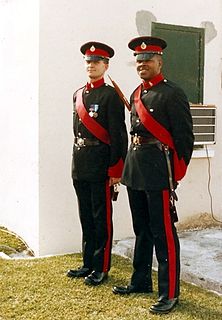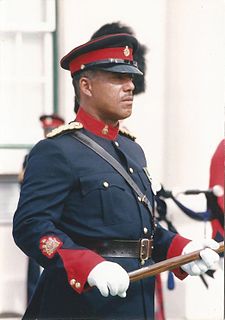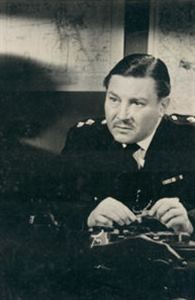Sergeant major is a rank used in various military and police organizations.
Sergeant major is a senior non-commissioned rank or appointment in many militaries around the world. In Commonwealth countries, the various degrees of sergeant major are appointments held by warrant officers. In the United States, there are also various grades of sergeant major, but they are all of the same pay grade of E-9. However, the Sergeant Major of the Army and the Sergeant Major of the Marine Corps, as their respective service's Senior Enlisted Advisor, receive a special rate of basic pay that is higher than all other sergeants major.
Sergeant major may also refer to:
- Regimental sergeant major, an appointment in British and Commonwealth military organizations
- Company sergeant major, an appointment in British and Commonwealth military organizations
- Eric "Sgt. Major" Clay, English rugby league football referee
- 3-5-8, a card game
- "Sgt. Major" (song), a song by Jet
- Sergeant major (fish), a tropical fish (Abudefduf saxatilis)
- Abrota ganga , a butterfly of Asia called the sergeant major
Regimental sergeant major (RSM) is an appointment that may be held by warrant officers class 1 (WO1) in the British Army, the British Royal Marines and in the armies of many Commonwealth and former Commonwealth nations, including Australia, Kenya and New Zealand. It is also an appointment that may be held by chief warrant officers (CWO) in the Canadian Forces and warrant officers of any grade in the Singapore Armed Forces, and is a rank in itself in the Irish Defence Forces and formerly in the British Army, Royal Marines and United States Army. Only one warrant officer holds the appointment of RSM in a regiment or battalion, making him the senior warrant officer; in a unit with more than one WO1, the RSM is considered to be "first amongst equals". The RSM is primarily responsible for maintaining standards and discipline and acts as a parental figure to their subordinates and also to junior officers, even though they technically outrank the RSM.

The company sergeant major (CSM) is the senior non-commissioned soldier of a company in the armies of many Commonwealth countries, responsible for administration, standards and discipline. In combat, his prime responsibility is the supply of ammunition to the company. He also oversees the distribution of other supplies, such as water or food, although that responsibility is mainly that of the company quartermaster sergeant (CQMS), and evacuating the wounded and collecting prisoners of war.
Eric Clay was a British rugby league referee popularly known as "Sergeant Major" for his style during games.
| This disambiguation page lists articles associated with the title Sergeant major. If an internal link led you here, you may wish to change the link to point directly to the intended article. |







